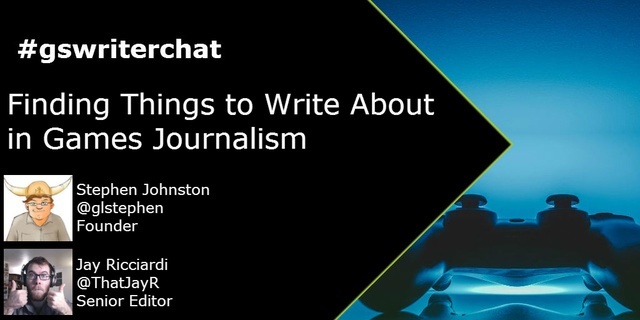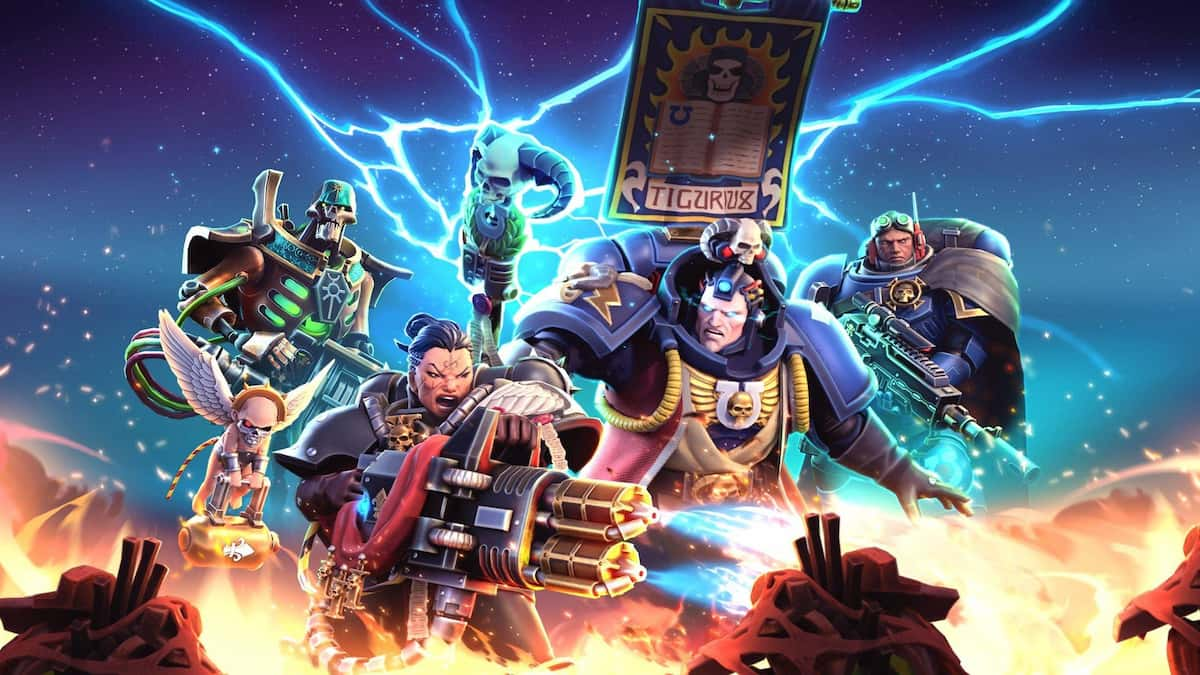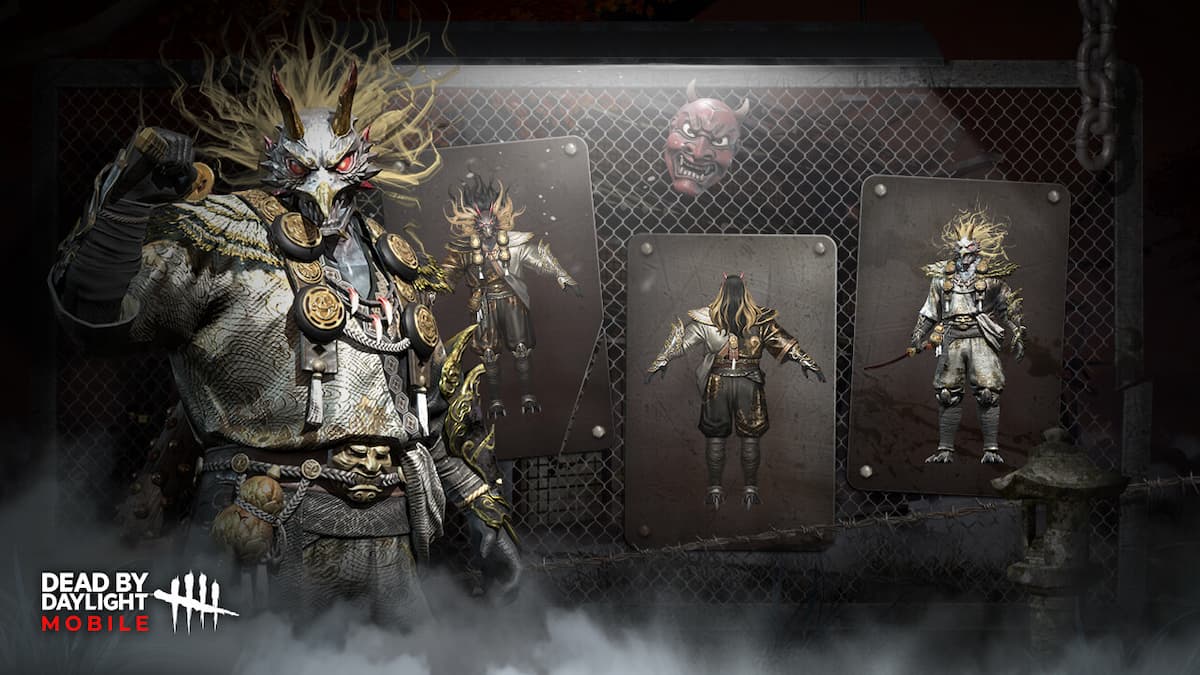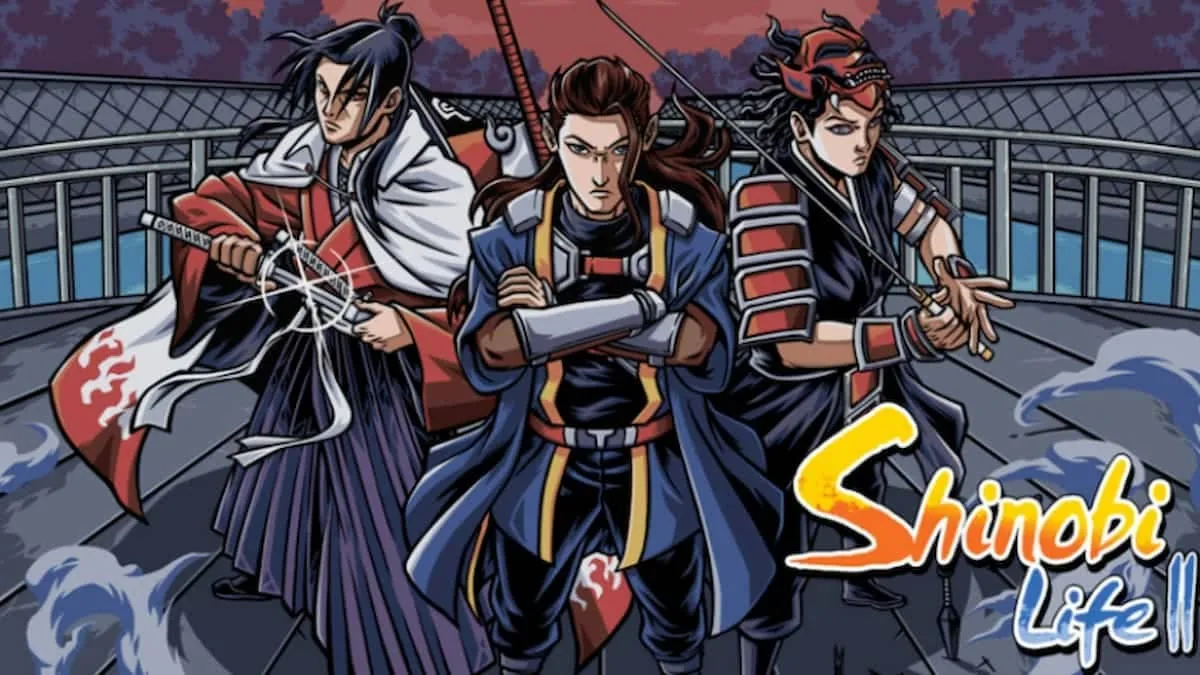We had a ton of fun during our first Twitter Chat on Wednesday, Feb. 3. Stephen Johnston, GameSkinny’s Founder, and Jay Ricciardi, GameSkinny’s Senior Editor, joined us to discuss some of the best ways to find things to write about in games journalism. This article is a recap of our Twitter Chat and highlights the thoughts and expertise of those who participated.
A Twitter Chat, or TweetChat, is a real-time Twitter event focused around a specific topic. It’s a chance to learn from industry subject matter experts and interact with people with similar interests in an informal way.
Join us for our next Twitter Chat, #gswriterchat, on Wednesday, Feb. 17, 2016, from 3 – 4 p.m. EST. Whether you’re a seasoned GameSkinny writer, a games journalist hoping to break into the industry, or a blogger writing about a non-gaming topic, our chats about online writing can help take your platform to the next level.
From Stephen Johnston:
A1: Simply it is news and information related to video games. #gswriterchat
— Stephen Johnston (@GLStephen) February 3, 2016
- “However, the textbook would say journalism is separated from communication by a systematic approach and process of verification and a goal to find the truth behind the facts. For GameSkinny I express this as being “reasoned and rational, but interest and passion as a guide for topics.”
- “Why is it important? Wow… well… it’s a huge industry and people need help navigating it.”
- “There is a lot of money being directed at acquiring a gamer’s time and attention. As games journalists we provide some filters, and amplifiers but also data and focused research the average consumer doesn’t have time to create.”
From Jay Ricciardi:
A1: It might not seem like it, but games journalism is still new and budding – it’s exciting to be on that bleeding edge!#gswriterchat
— Jay Ricciardi (@ThatJayR) February 3, 2016
- “(Oh and the obvious answer – games journalism is journalism about games 😉 ).”
From the Community:
- “Honest reporting on video games + industry/culture, important because it’s as valid an artistic medium as films or books.” @ZanneNilsson
From Stephen:
- “Research skills, empathy and an ability to write, and a curiosity for digging into things.
- “Research skills are critical to find topics, and the topics behind the topics. At times though, if you are gamer:
A2: Then research is that time every night you spend playing games. #gswriterchat
— Stephen Johnston (@GLStephen) February 3, 2016
- “You need a dose of empathy because you have to understand who your audience is and why your efforts are important to them and what they are looking for from your work. It can be how to complete a game, or whether a game is good, or simply a release data and platform info. Empathy ensures you understand why are doing what you are doing.”
- “Writing ability is paramount, but like many things the more you write the better you get. (that’s why we built the JTP)”
- “Curiosity! @ThatJayR mentioned skepticism and curiosity and skepticism can lead to critical discoveries.”
From Jay:
- “A healthy dose of skepticism! (and excellent written communication skills).”
- “You need a lot of creativity and critical thought: you have to anticipate what gamers are *about to* find interesting.”
From the Community:
A2: A journalist MUST know their subject. A games journalist that doesn’t play games is like a chef that won’t eat. #gswriterchat
— Autumn (@Prinnrose) February 3, 2016
- “The ability to write a compelling and coherent sentence. If you’re bored writing it, I’m bored reading it.” @businesslioness
- “Knowledge of video games and the influence in surrounding culture.” @MXAGhost
From Stephen:
- “Start writing about games and train yourself to think critically about them.”
- “I’m going to be a corporate shill, but that is what @GameSkinny is all about.”
From Jay:
- “Ah yes, time to break out my cop-out answer: If you want to get into journalism, you need to START WRITING!”
- “The internet being what it is today, anyone can start on GameSkinny or start their own blog. You just need to write. Of course, GameSkinny makes things easy- GS removes all the stress of making and managing a website so you can just write.”
- “GameSkinny has our own Games Journalism Program (I might have something to do with that, cough):http://www.gameskinny.com/z8dq3/apply-to-gameskinnys-2016-journalist-training-program-sessions.”
From the Community:
- “I’m a bit biased, but GameSkinny’s Journalism Training Program is probably a good place to start!” @ZanneNilsson
- “Learning how to write (& write well) is Step 1. Finding where to write is Step 2. GameSkinny is a great place to start.” @auverin
- “Knowledge of video games and the influence in surrounding culture.” @MXAGhost
From Stephen:
- “I think that ultimately a great article answers a question. Simple as that.The questions are different, but if you think about why a person is coming to you they are asking a question.”
- “Is this game good? How do I get past this part of the game? What are the pros and cons of this aspect of game culture? Is the hype real? Should this game by more hyped? Did I collect all these items?”
- “90% of what we deal with ultimately answers a question, then we deal with some heavily researched or nuanced topics that might be exploration or summary focused and just more about open ended information.”
From Jay:
A4: Same as any article: a good story. People care about great narratives (especially gamers, who woulda thunk?) #gswriterchat
— Jay Ricciardi (@ThatJayR) February 3, 2016
- “You’ve got to know what people are looking for, REALLY looking for – not just what you think they should be looking for.”
From the Community:
- “An interesting subject and smooth writing, plus some mysterious ingredient I haven’t figured out.” @zanneNilsson
A4: Good research, clear prose, and a smart angle. Passion for the topic is a big plus — it makes your writing stand out. #gswriterchat
— Rob Guthrie (@RobertWGuthrie) February 3, 2016
- “I read articles 2 learn about something I don’t know. So, tell me something (or more a/b something) I’m not familiar with.” @businesslioness
- “Confidence in your research and knowledge. Be a guru on your article. Articulate – never allow room for misunderstanding.” @Prinnrose
From Stephen:
A5: Overcoming distrust of your gut or thinking that no one is interested in a topic that you are. #gswriterchat
— Stephen Johnston (@GLStephen) February 3, 2016
- “The internet is literally the greatest, currently available, technology to ever marry niche interest to niche content. Gaming is $100+ billion “niche” and there are vast quantities of varied interests that can be addressed.”
- “On a more fundamental level some articles take time to develop a full story and a compelling narrative. This is one reason we run a @SlackHQ chat for our JTP so people can bounce ideas and get input on related items.”
From Jay:
- “When you’re starting out, you’re not on Ubisoft’s ‘to contact about big news’ list, so you need to be resourceful.”
- “Having an article that is still readable and clickable even after everyone knows what’s up. If you’re not first, be best.”
From the Community:
- “Finding something official that ISN’T just a sales pitch.” @ZanneNilsson
- “The Forest of Press Releases is vast and depressing.” @thatjayr
A5: Finding new and engaging ways to approach content that’s already been reported on. #gswriterchat
— Auverin Morrow (@auverin) February 3, 2016
- “Sometimes you do the research and a story just isn’t there. Learning to drop a lead can be rough, but it’s an important step.You have to be flexible. And fast. And smart. People won’t like what you have to say. It’s not always easy.” @robertwguthrie
- “Reading is the best way to come up with content. Think of something you want to read – is there an article? No? Make it.” @prinnrose
- “Great point! Identify content gaps and fill them!” @thatJayR
- “We couldn’t find Dogmeat in our copy of Fallout 4, so Stephen found a solution and wrote about it.” @farrowk87
From Stephen:
A6: The vast majority of games journalists play games so the first article topic source is: Yourself #gswriterchat
— Stephen Johnston (@GLStephen) February 3, 2016
- “The core idea can come pretty easy, but hunting down the details is where the work comes in.”
- “Another good source is to find topics covered other places but that you have unique info or perspective on. Sign up with every PR agency too. Yes, they send their story and angle, but you can explore it your own way.”
From Jay:
A6: GODDAMN EVERYWHERE. There’s a great big and wild internet out there – full of forums, subreddits, blogs, and social media! #gswriterchat
— Jay Ricciardi (@ThatJayR) February 3, 2016
- “This man speaks the truth. GO FORTH, YOUNG JOURNALISTS. SEEK YOUR DESTINY.” @auverin
- “It’s good to ask: ‘what would I share on my social media?’ – whatever that is, write it. Other people will love it too!”
- “If a lot of people are talking about it, you should be writing about it. Don’t waste time in comments, jump to writing!”
From the Community:
- “This is the easy part! Read, play, participate. You may not get a big scoop, but you’ll have something to say.” @robertwguthrie
- “Literally anywhere… News you’ve read, a conversation with friends, playing the games. Keep a notebook & jot them down.” @QuintLyn
- “Ask yourself what you would want to read about. What’s compelling to you will likely be compelling to someone else also.” @auverin
- “One source is your own interests. For me, game history + women in the industry = an article still getting views today!” @ZanneNilsson
From Stephen:
- “Unexpected info, discord with hive mind, great narrative and/or complete answers drive the most traffic and engagement.”
From Jay:
- “Ask two questions: “would a non-gamer read this?” and “would a die-hard fan share this?” If yes to either, GET ON IT.”
- “Look at what works! What has been successful or ends up on a site’s ‘Top Articles’? (like http://www.gameskinny.com/top/articles).”
From the Community:
A7: One good kind of topic is a controversial one. Don’t be afraid to take a stand – controversy gets views! #gswriterchat
— Zanne Nilsson (@ZanneNilsson) February 3, 2016
- “See how people are responding to it. If comments sections or the reddit boards are going crazy, you’re onto something.” @auverin
- “Hidden gems are everywhere. Research your topic, find out how players are reacting. Is there something new and different? Just because a game doesn’t get a lot of press attention doesn’t mean it isn’t popular.” @prinnrose
- “If you feel a strong, irresistible “OMG I have to pee!” Sense of urgency about the topic, write about it.” @businesslioness
From Stephen:
- “Best is hard to answer. Engagement, traffic, shares, reading time and return visits are critical to measuring quality. Guides, tips and tricks often drive lots of raw traffic. Deeper exploration of topics drives reading length.”
- “Controversy drives engagement and authority and trust often drives return visits. So a possibly controversial deep exploration that answers a question with verifiable authority is an awesome goal!”
From Jay:
A8: hahahahaha (breath) hahahahahahahahahaha (how many characters left in this Tweet?) hahahahahahahahahahahahahahahahahahaha #gswriterchat
— Jay Ricciardi (@ThatJayR) February 3, 2016
- There is no set ‘this content will do well’ formula, unfortunately. If there was, my life would be so much easier!”
- “Sometimes the best thing to write about is the latest controversy or AAA game, sometimes it’s Flappy Bird or Neko Atsume. Over time, nothing is more successful than evergreen(by definition). You just need to identify what good evergreen will be.”
- “Usually, answers to frequently asked questions are great. Try to think about what people are putting into Google!”
From the Community:
- “For me it was the guides. I was a terrible games journalist before I picked up guide writing. However that’s not for everyone. Some of the best pieces ended being news and editorial pieces from other writers.” @gkellauthor
- “If there’s one true answer to that, I haven’t found it yet.” @ZanneNilsson
- “Solid thinkpieces, examinations, and deep content of any sort — you want an article that will last. That’s assuming, of course, that you can’t get a cutting edge scoop from an inside source or something equally exciting. I mean, they can’t all be high-level journalistic bombshells…” @robertwguthrie
A8: Write what you want to read. If you want to know about something in gaming, chances are other people do too. #GSwriterchat
— K Farrow (@farrowk87) February 3, 2016
- “Sometimes you just have to go with your gut. Readers like to know about people, drama, and the absurd.” @quintlyn
- “They are a ton of work, and require near perfect accuracy, but well-timed and well-written guides will always be in demand.” @prinnrose
From Stephen:
- “No, you don’t *have* to be a gamer, but it helps. A love of writing and critical thought can take you far.”
- “Being a gamer is a reliable source of leads though, that is a huge advantage. Ultimately, we feel that gamers bring a unique perspective to GameSkinny – but I don’t think it is the top requirement.”
- “The ability to be reasoned and rational about topics and to do research is the most critical.”
From Jay:
- “To be a good journalist, you need to be able to write well, research well, and fact check well. You are a writer first.”
- “Having game knowledge is ideal, but no one cares how many times you beat Mario if you can’t write well or fact check.”
From the Community:
- “Kinda, I mean, In order to effectively judge a game or critique it, you should experience it first.” @MorningStarz101
- “It would certainly help, but I’d say it’s more important to be a good writer. “Gamer” is such a loose term anyway. @ZanneNilsson
- “You’ll be better equipped to discuss the topic with knowledge if you’re familiar with it, but writing ability comes 1st.” @QuintLyn
- “You don’t have to be a gamer, but you do need an understanding and appreciation of the industry to make good content.” @auverin
- “Absolutely! If you can’t convince your readers that you’re the next Mozart of gaming, you will never build up credibility.” @prinnrose
Thanks so much to Stephen Johnston, Jay Ricciardi, and all the other awesome individuals who participated in our first Twitter Chat! Looking for more information and resources about games journalism? We got you covered. Check out the links below:
Introduction to Writing for GameSkinny
Free Download of the Games Journalism Crash Course
What are your answers to some (or all) of the questions above? Share your thoughts and expertise in the comments below, and be sure to join us for our next Twitter Chat #gswriterchat.
















Published: Feb 5, 2016 11:29 am